MH: What made the Warden Service such a unique organization?
CS: I guess part of it was you were trying to apply modern science and other techniques but at the same time, people still had to have the skills from a hundred years before, working with horses in the backcountry and that sort of thing. There’s not too many jobs where you have that kind of mix of skills that you used to need. To a certain extent, people still do that now. And I think the camaraderie, certainly for people in life threatening situations, rescues, picking up dead people. It certainly bonds people and then there is the black humor that goes with a lot of that which is also a bonding thing. You don’t get that unless you’re in the RCMP, EMS and that kind of jobs.
Talking about stories, when I first went to Lake Louise, Al McDonald was my supervisor and I had only been working there for about a week and we get called out to a heart attack up at the Chateau Lake Louise. That was when we were still doing ambulance service with that old brown van. So we get half way up the hill and there’s smoke pouring out the back so we pull over and here we are, the rescuers, stranded. So we radio down and highways was having a meeting so one of the guys comes up with the orange light going, we grab a crash kit and oxygen and he brings us to the Chateau. We arrive about the same time as the ambulance from Banff. It was a little embarrassing. It wasn’t too many years later that we got out of running that. There were lots of stories working that over the years. I was in one evening and we had a call about someone at the hotel in trouble. Ron Leblanc was out of town on the 1A and we had to respond with two people, so one of the RCMP officers, Catherine Goodyear, said she would drive the van for me. So we respond and pick up this woman who is having a stroke. We are driving towards Banff to meet the ambulance and Catherine is driving and she was just pouring it on. She’s used to driving these police cruisers so she’s looking for all the lights and stuff. I told her to slow down. I said,” Your last name might be Goodyear, but it doesn’t mean to say that you have to take all the rubber off our tires”. She kind of goes “don’t let her die this side of Castle Junction” because it would have meant paperwork for her. Some of that black humor. We met up with the ambulance and safely transferred her over. She lived, we lived, but I insisted on driving back.
There were some bad accidents. I remember one day I was walking home from work and I heard all the sirens and the ambulance head out. There’d been a big accident at Bath Creek Flats with four people killed. I remember Dave Norcross talking about standing there and realizing there was an arm laying on the side of the road and he kinda pushed it out of sight. I was just so glad I wasn’t on that one. There were lots of times where tourists would ask me, “aren’t you afraid of being in the backcountry?” and I’d go, “the most dangerous part of the job was getting to the trailhead”.
MH: Do you have any lasting memories as a Warden?
CS: Horse wise, there is a legend in Jasper, Ernie, the big Palomino packhorse. He had feet the size of dinner plates. The barn boss gave me a special set of shoes to use if I had to replace the shoe because there wouldn’t have been any shoes in any of the cabins that would fit Ernie. He had one speed which was dogging along but if you could get it up on him, he would carry it. He was one of the Blue Creek pack horses so whoever worked in that district, Ernie was one of the packhorses. I remember managing to get a chair up on top. There were two cabins, the main Blue Creek Cabin and then two up the side valley, Topaz and Caribou Inn. Topaz I went by, and they only had little benches and no chairs so I packed up one chair from Caribou Inn and managed to get it tied onto Ernie and moved down to Topaz. One other story with him, I was up at Starlight cabin in Eastern District and jingling the horses, couldn’t find them, couldn’t hear bells, couldn’t track them and finally I hear a little tinkle up on an avalanche slope with aspen trees and I look and I look and I see this white blaze on his face and he’s standing, trying to hide his bulk behind an aspen tree. And he’s got his head stuck out to the side looking and just standing there. And as soon as he realized I was coming up the slope for him, he went back to eating and the bells were clanging. There were definite characters in the horses. Whenever you met someone who had worked in the Blue Creek district, you were sharing Ernie stories.
Cabins – there were a few holes in the wall that you only wanted to stay at once, the Three Slides cabin in the north boundary was kinda like that but other than that, there was something about all of them, you were just out there in the wilderness and it was great.
4020: Another Ernie story was having jingled in the rain at Seldom Inn and I had just taken my rain pants and tucked them under the diamond hitch and arrived down at Blue Creek Cabin, and so I took those pants and without thinking, I hung them up outside the tack shed on a nail and had the three horses tied up to the hitching rail, went up to the cabin to unpack and let the horses eat their oats in their nose bags. All of a sudden I hear this commotion and a little breeze had come up, and the pants had flapped so the horses had pulled back and popped the railing off the hitching rail, and they have this tug of war going. The one horses halter had slipped off the rail so there was Ernie and he was backing around the yard, dragging this hitching rail and eating his oats really fast, he didn’t want to stop doing that, dragging this hitching rail around! That’s why it was so frustrating breaking my arm this summer by just falling backwards getting into somebody’s camper because there were so many opportunities to break something in the backcountry.
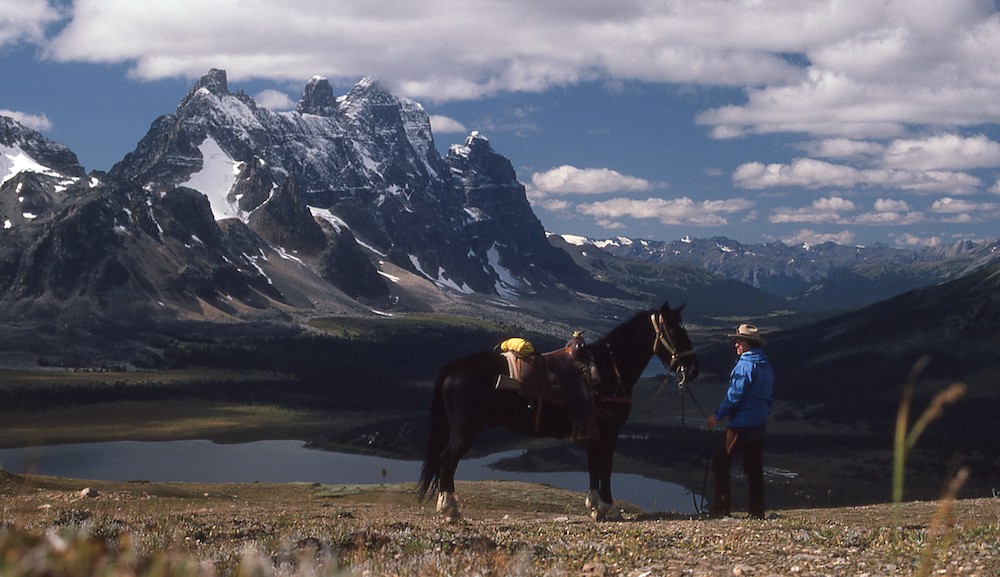
Cyndi with Earle, The Ramparts, Tonquin Valley, Jasper National Park
MH: Any other stories?
CS: As far as wildlife stuff, it wasn’t an event but just the opportunity to work in Aulavik National Park and Banks Island and hundreds of Muskox. It kind of took me back to growing up on the prairies as if they were cows all over grazing. And working with the Aulavik staff was a neat opportunity and being up there in the 24-hour daylight. The one trip I did, a 10-day canoe trip on the Thompson River and filling out the wildlife card on day 1, and it said elevation so I’m looking on the map and I go, “Oh, 100 Meters and we’ve got 10 days to go down river, I don’t think there are any rapids on this river, pretty flat.” Just seeing all the historic cairns and tent rings, peregrine falcons, yes it was really neat. I only worked one summer with two main trips into the park because it is so far to go. I kind of had the opportunity to work longer in the Western Arctic Field Unit but after working in Jasper and Banff, to not be right in your National Park, I just couldn’t see doing that for very long. They were awesome places but you just weren’t right in the park all the time. Maybe it was a missed opportunity but I did get into Aulavik NP and went back and hiked into Tuktuk Nogait National Park with friends. So the northern parks are quite different that way. They are awesome wilderness, spectacular areas but it’s quite different than down here where you are living in or near your National Park, you can get out on a daily basis to do things. It was quite different and I just didn’t look forward to that kinda thing. I liked a little more hands on, daily work in the park kind of thing.
MH: Do you ever miss being a Warden?
CS: One of the things I miss is working in the backcountry, especially in the fall. It’s just so nice ‘cause the bugs are gone so the horses weren’t fussing all the time, the fall colours. Some of those late fall/early winter times up at Indianhead, it was a little snowy, couple of feet of snow trying to get across creeks with ice, don’t miss that part of it but September, it was always so wonderful in the backcountry.
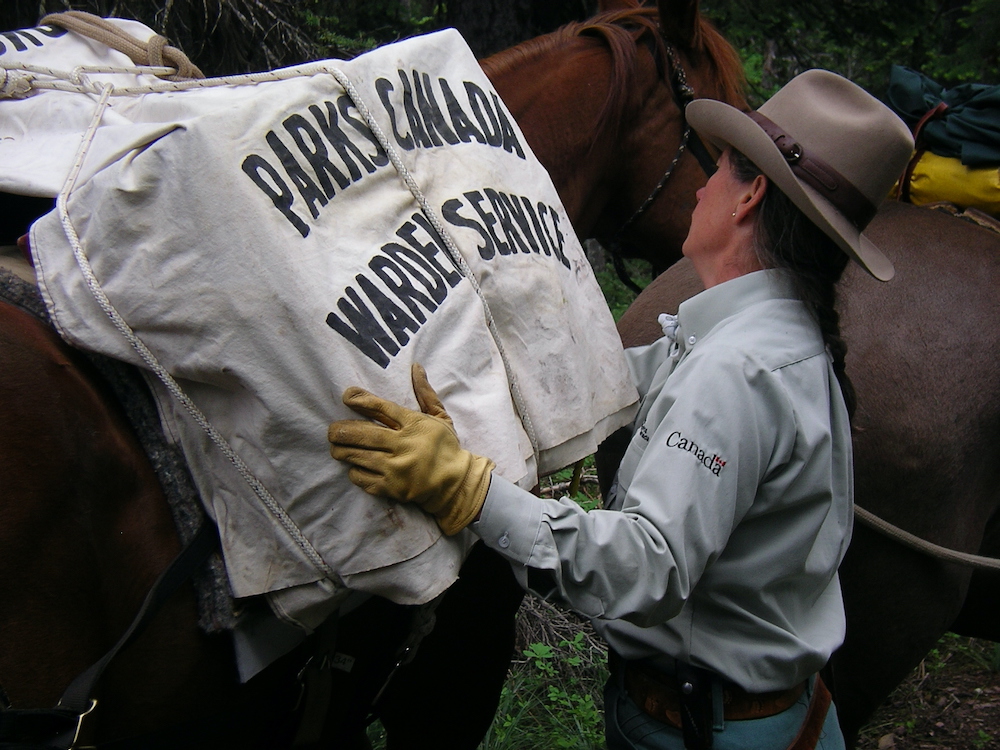
Cyndi at Indianhead Summit on Kelly with Virgo
MH: Do you have any photos of yourself as a warden that you would like to donate? Artifacts? 4300:
CS: Yes I can.
MH: What year did you retire? 4600:
CS: 2012
MH: What do you enjoy doing in retirement? 4605:
CS: A lot of the same things I did for work, cross country skiing, backcountry skiing, hiking, bicycling. Still doing some volunteer work in Waterton and locally with Whitebark and Limber Pine because I’d gotten involved with that a lot in Waterton. Still volunteer down in Glacier Park in Montana. There never seemed to be enough time and there wasn’t the encouragement often to publish your research so there is still some data I collected with Harlequin Ducks and Whitebark that I’m picking away at writing scientific papers for that. And then I’ve really gotten into bird banding which I’ve started a monitoring and productivity and survivorship banding station here in Banff and Waterton so I still manage both of those so I get out there and band. And traveling. I was thinking too that we had the chance to work with some of the younger staff when I was a Warden. Like I took Lisa Paulson out on her first backcountry horse trip for five days and John Mackenzie, and working with Karsten Heuer and the young people that came in at the time. A lot of them were from the cities but they didn’t really know. They had backcountry recreational kind of experience but not working with horses and that kinda thing so that was always fun to share that knowledge with them. I remember you dispatchers being quite jealous when I got to go on a backcountry trip with John McKenzie. Beautiful smile. I had to tell him how to make coffee using a percolator. He said, “Hey, I’m from Toronto, I drink cappuccino!”
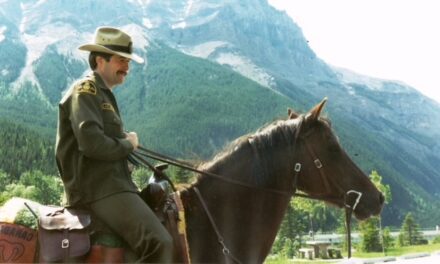
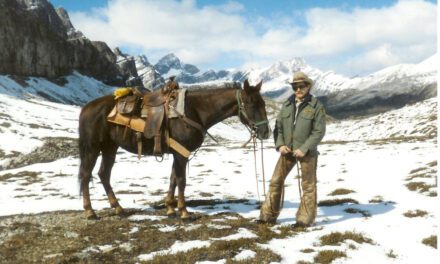

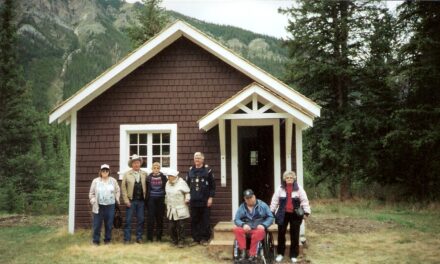
Wow, I just started reading some of these interviews. I knew Cyndi back in the early days in Jasper….great to read this.
I always admired cyndi, i knew of her thru my older sister and as a youngster from my youth thru to my warden days. I followed her career with interest. I even ran into cyndi one time at the same row in the periodical section of the library at sfu during one of my seasonal layoff, I guess our interests paralleled each other to that level. Was proud of her pursuing the masters degree, it was a good fit but im sure it also presented challenges which she met head on.. And I related to many of the stories Cyndi told…mike eder used to speak fondly of Earnie too, and I related as well to her observations of warden culture over the years (for one thing, I can imagine the untold stories of the horse trip with Lisa Paulson). An enjoyable bio to read.